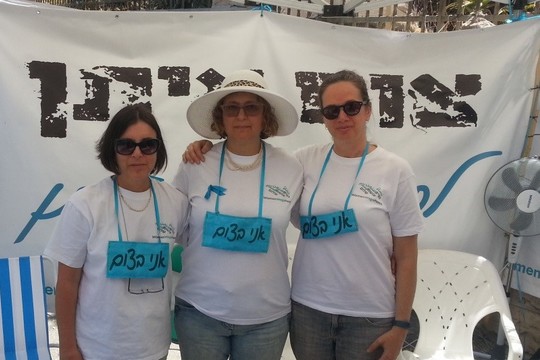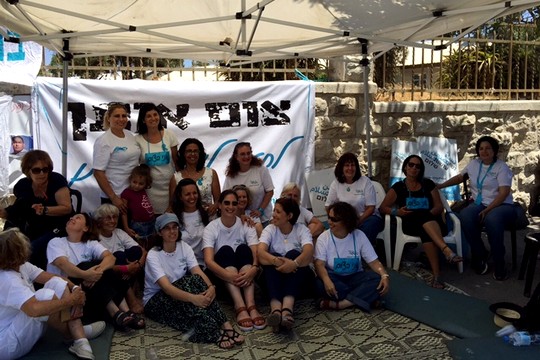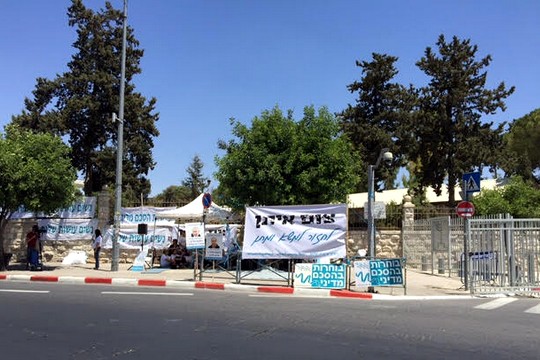Can a peace group be apolitical? Could I be part of a movement that tries to be? Twenty-five hours of fasting and frustration.
By Shoshana London Sappir

When I was asked to join a communal fast on the anniversary of the July 2014 Gaza war, I thought it was a brilliant idea. A group of women would fast in 25- or 50-hour shifts in front of the Israeli Prime Minister’s Residence for 50 days, coinciding with timing of the 50-day conflict last year, and demanding the government pursue peace. Women Wage Peace, the group that organized the event, gave it the catchy title of “Tzom Eitan” – a play on the official name of the Israeli military operation, “Tzuk Eitan” (“Protective Edge” in English, literally “strong cliff”), but with the word for “fast” replacing the word for “cliff.”
Having just returned from my 25-hour fast, I would like to share my experience, which was at times uplifting and at times disturbing. At times I was on the verge of quitting, going home and eating. But in the end I stuck it out till the end of my fast, and then some. I spent most of the time in conversation but also in heated arguments. I left feeling physically weak and politically confused.
The action spoke to me on many levels: I thought of it as a political protest with religious undertones. I felt in communion with Gandhi, hunger strikers in prison, and the noble tradition of nonviolent resistance. I loved that the dates coincided with the Muslim fast of Ramadan and the Jewish fast of Tisha b’Av. I signed up.
Armed with my conviction and a big sun hat, I arrived at the designated time and took my place in the protest tent, in the same location where I have attended countless demonstrations against war, occupation, racism, vandalism of churches and mosques, the government’s economic policy over the past 35 years. Over the next 25 hours, however, I would learn that the group that organized the action had very different ideas about its meaning than I did, to the point that I almost quit. But every time my doubts surfaced, so would supporters who dropped in and encouraged me to stay, expressing identification with my message and respect for my action.
Supporters came and went, some for minutes and others for hours, appropriately making the experience feel like sitting shiva. They came from all over the country and even abroad. A rabbi and a musician drove down from northern Israel to deliver a Dvar Torah and a round of We Shall Overcome in English, Arabic and Hebrew. Another woman, whom I had met doing relief work in Palestinian villages in the West Bank, also came by. An elderly friend of my mother’s who lives in the neighborhood sat with us for a bit on her way to the supermarket and then again on her way back.
But while I was getting very strong messages of support from the street, I also received strangely demoralizing messages from none other than the organizers themselves. It began with them vigorously working the phones in an attempt to bring prominent members of the political Right, even the far right, to the tent. When I asked why, they explained they wanted to broaden the movement to include all women who want peace, and were especially interested in reaching out to sectors of Israeli society that disagree with them. I’m not against that in principle but I watched the message being watered down before my eyes and saw how the effort directly diverted resources away from the goal of strengthening the movement’s base: by gaining women from the Right they risked losing women like me. And sure enough, the more I asked the organizers’ about their agenda, the less comfortable I felt.
Several people fasted and a couple of WWP representatives were in charge during each shift. I am still not sure whether the two women on my shift reflected the group’s official line or their own points of view, but for as long as I was there it was they who spoke on behalf of WWP, and we had sharp differences.

In an attempt to appeal to the broadest audience possible, they refused to take a stand on any of the core issues that define the struggle for peace as I understand it, and which is what drove me to join them: social justice, human rights, occupation, racism, equality, democracy. The most they would commit to was demanding the government “return to negotiations,” the slogan writ large on our banners, under the title of the fast. It should come as no surprise that many a passerby shouted out, “with whom?” even from moving cars. As for the war we had gathered to commemorate, the discourse was limited to our desire as Israelis to keep our loved ones out of harm’s way, but stopped at recognition of the destruction we had wrought on the Palestinian side.
When visitors from the public or the press asked about the group, I was dismayed to hear WWP people repeatedly describe it as an apolitical women’s movement and emphasize that it was “not leftist.” “God forbid” was not as much said as implied. I asked them, as a leftist, where that left me. Again I was told it was a movement for all women who want peace. I was shocked by how casually they distanced themselves from the Left and adopted a rhetoric that has fueled a campaign of delegitimization and jeopardized the safety of leftist activists.
The low point for me was when the organizers invited the wife of one of the heads of Elad, an organization dedicated to evicting Palestinians from their homes and replacing them with Jews, to join us for a dialogue. Their line of thinking, they explained to me, was that we can find common ground with other women in the desire for peace even if we do not agree on the details. My thinking was that such a group represented a dangerous ideology we should confront head on, not try to engage.
Just as I was on the verge of walking out, along came Rachel Elior, a popular professor of Jewish thought, and an active anti-racism campaigner. I asked what she thought of the organizers courting the far right. She was surprised to hear and couldn’t see how that contributed to the cause of pressuring the government to pursue peace. She thought those groups’ world view was far too contradictory to our cause to be helpful. Because Rachel was there, I stayed and sat next to her in the circle we had formulated in the tent when the Elad lady came. Before I could get into any argument with her, however, A. interrupted me: “That is not what we are here for.” I thought it was. If we were to use this opportunity to enlist this woman to support peace, it seemed reasonable to me to try to discuss the impact of her actions on Palestinians.

A discussion ensued in which the organizers spoke about being a movement for women of all persuasions united around the wish for peace. Rachel pointed out that every normal human being wishes for peace; the question is on what terms. As an expert on Jewish history, she added, she knows in all the excruciating details how our people suffered under foreign rule, and she could not accept us doing the same to others. Before she left Rachel turned to me and said: despite your misgivings, your being here is important and meaningful. It makes a difference. Please don’t give up, stay the course.
So I did.
As time passed the atmosphere became increasingly social and I discovered personal connections with all of the people with whom I had been arguing. We were all too interconnected to be antagonistic. At the end of the day, despite serious misgivings, I decided there was value in sticking it out.
Two of my co-fasters slept over at my house and made it into a sort of slumber party without food. In the morning all three of us felt quite weak but we were only supposed to fast until 11 a.m. One of my friends spent the whole morning laying on the ground in the tent face down.
A religious Jew in full gear sat down with us. He identified himself as Moshe, a far-right-leaning former student of Rabbi Goren and the Merkaz Harav Yeshiva – ground zero of the settlement movement. Our visitor said: “The Torah is the most important thing in my life, and peace is the most important thing in the Torah, so of course peace is the most important thing for me. As a religious Jew I cannot agree with your fasting, because Judaism frowns on fasting outside of the religiously prescribed days. Nor do I agree with your politics at all. However, I am personally so moved and impressed by the fact that you are fasting that I had to come and hear what you had to say.” Moshe went on to express to his objections (“Who are we going to make peace with?” “They all hate us”), but before he left my friend got him to recite out loud with her, from a written page in Hebrew and Aramaic, “The Prayer for Peace.” It was moment of unity on a human level, but did it have political value?
In the last hour of my 25-hour fast, Prof. Charlie Greenbaum, an octogenarian activist for children’s rights, came to show his support and talked to us about the power of fasting from the perspective of social psychology, his field of expertise: From the faster’s point of view, the experience of hardship and suffering increases the sufferer’s commitment to their cause. From the point of view of the public witnessing the fast, the sight of someone willing to make a sacrifice for their cause elicits deep respect and gets people’s attention. Thus, people like Moshe. This opened a discussion about why we were fasting, and I learned that many of the eight or so women who were fasting together at that point felt they were making a radical statement of protest and identification with the suffering of all sides in the conflict.
Through all the ups and downs, I observed just how deep the gulf is between the rhetoric of the movement’s representatives and its rank and file. Movements like Women Waging Peace could be much more effective if they accept that taking a clear stand on the issues will inevitably involve conflict.
On the way home I felt lightheaded and asked the taxi driver if he had any water. He apologized that he didn’t as he was fasting for Ramadan. I told him that I was fasting too and asked if he had seen the protest. We talked about fasting, breaking fasts and protests, and when we got to my house he did not want to take any money, “because you fasted and protested for peace.” I insisted on shoving my money into his clenched hand and wished him: Sawmak makbul, may your fast be well-received.
Shoshana London Sappir is a journalist and translator living in Jerusalem. This post also appears in Hebrew on Local Call. Read it here.
